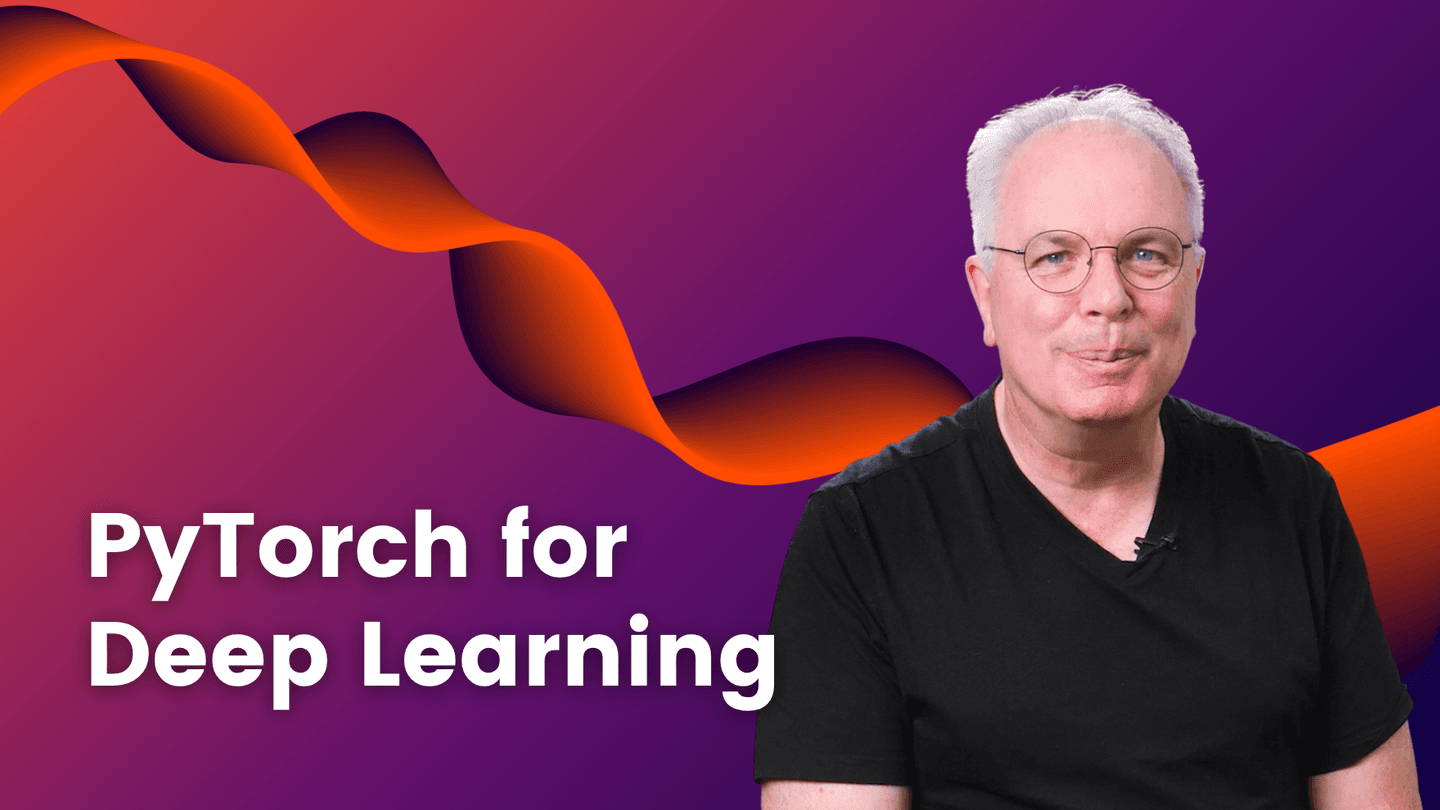Build deep learning systems step-by-step: Code neural networks from the ground up in PyTorch. Work directly with tensors, neural networks, and training loops to create and evaluate your first image classifier.
Welcome back!
We'd like to know you better so we can create more relevant courses. What do you do for work?

You have successfully joined undefined
You now have access to all Pro features. Click below to start learning!Session Expired
Session expired — please return to Cornerstone to restart the session and complete the course.

PyTorch for Deep Learning
Instructor: Laurence Moroney
DeepLearning.AI
Also available on Coursera

- Intermediate
- 102 hours 29 mins
- 77 Video Lessons
- 11 Code Examples
- Instructor: Laurence Moroney
What you'll learn
Apply your skills to vision and natural language tasks: Use TorchVision and Hugging Face models, fine-tune pretrained models, compare architectures, and boost performance through hyperparameter tuning.
Advance to modern architectures and deployment: Explore structures such as Siamese networks, ResNets, and Transformers. Interpret model behavior, and prepare your models for deployment using tools and techniques such as ONNX, MLflow, pruning, and quantization.
Why Learn PyTorch
PyTorch is one of the most widely used frameworks in AI research and production. Its Python-based design makes it easy to experiment, debug, and scale models, from simple prototypes to deployed systems.
Through this Professional Certificate, you’ll learn how PyTorch powers the full deep learning workflow. Build and train neural networks from scratch, develop deep learning models for computer vision and natural language processing, apply transfer learning and fine-tuning, plus design advanced architectures used in modern AI applications. You’ll also learn to prepare and deploy models for real-world use.
About this Professional Certificate
Building practical deep learning systems means going beyond theory. The PyTorch for Deep Learning Professional Certificate teaches you to build and train the deep learning models that power real AI applications, using PyTorch — one of the most widely adopted frameworks in research and industry — to design efficient, reliable systems.
In this 3-course professional certificate, you’ll learn through hands-on projects that mirror the challenges faced by deep learning engineers: designing efficient architectures, applying transfer learning and fine-tuning to pretrained models, using interpretability techniques to understand model behavior, and preparing optimized, portable models with ONNX and experiment tracking tools like MLflow. Along the way, you’ll gain experience with techniques used across modern AI applications, including pruning and quantization.
Whether you’re strengthening your career in machine learning, expanding into applied AI, or building your own projects, this certificate gives you the skills and the confidence to turn ideas into working PyTorch models.
Start building deep learning systems that make an impact!
Upon completing the PyTorch for Deep Learning Professional Certificate, you’ll earn credentials demonstrating your ability to build and deploy deep learning systems using PyTorch, the most widely adopted DL framework of today
Instructor
Hands-on projects for a better learning experience
Across three courses, you’ll complete hands-on programming labs that take you from coding your first neural network to preparing efficient models ready for real-world deployment with PyTorch. You’ll learn how to diagnose pneumonia from chest X-rays, classify text into categories, build a translation system, and much more. Through guided projects, you’ll:
Begin by building your first neural networks in PyTorch, then take on image classification as you teach a model to tell apart categories like flowers, insects, and animals while learning how neural networks learn from data.
Improve model performance and efficiency on real datasets. Experiment with optimizers and learning-rate schedulers, automate hyperparameter tuning with Optuna, and use profiling tools to identify bottlenecks in your training pipeline.
Apply PyTorch to computer vision projects using TorchVision to load, transform, and augment image data; fine-tune pretrained networks like ResNet and MobileNet; and visualize predictions with saliency maps and class activation maps.
Build and fine-tune language models using Hugging Face and PyTorch. Implement text preprocessing, compare embeddings (GloVe, FastText, DistilBERT), and train classifiers that can analyze real text datasets.
Explore advanced architectures in PyTorch by building transformer models from core components like multi-head attention, and get an introduction to modern generative approaches such as diffusion models.
Prepare models for real-world deployment by exporting them with ONNX, tracking experiments in MLflow, and applying pruning, quantization, and quantization-aware training to reduce model size and latency.
Course Outline
PyTorch: Fundamentals
This course is part of PyTorch for Deep Learning
- The Building Blocks of Neural NetworksVideo・5 mins
- The ML PipelineVideo・5 mins
- Quiz 1Practice Quiz・10 mins
- Building a Simple Neural NetworkVideo・5 mins
- Building a Simple Neural NetworkCode Example・1 hour
- Activation FunctionsVideo・6 mins
- Modeling Non-Linear Patterns with Activation FunctionsCode Example・1 hour
- TensorsVideo・5 mins
- Tensor Math and BroadcastingVideo・4 mins
- Tensors: The Core of PyTorchCode Example・1 hour
- Join the DeepLearning.AI Forum to ask questions, get support, or share amazing ideas!Reading・2 mins
- Decoding a Secret MessageVideo・3 mins
- Overview of the ML Pipeline with PyTorch - Part 1: DataVideo・4 mins
- Overview of the ML Pipeline with PyTorch - Part 2: ModelsVideo・4 mins
- LossVideo・5 mins
- Optimizers and GradientsVideo・5 mins
- Device ManagementVideo・4 mins
- Quiz 1Practice Quiz・10 mins
- Image Classification - Part 1: Preparing the Data and Building the ModelVideo・5 mins
- Image Classification - Part 2: Training and Evaluating the ModelVideo・4 mins
- Building Your First Image ClassifierCode Example・1 hour
- CNNs - Part 1: Filters, Patterns, and Feature MapsVideo・6 mins
- CNNs - Part 2: The Full ArchitectureVideo・5 mins
- Train a CNN for Image ClassificationVideo・5 mins
- Quiz 1Practice Quiz・10 mins
- Building a CNN for Nature ClassificationCode Example・1 hour
- Dynamic GraphsVideo・5 mins
- Modular ArchitecturesVideo・4 mins
- Model Inspecting and DebuggingVideo・5 mins
- Model Debugging, Inspection, and ModularizationCode Example・1 hour
Recommended Background
Familiarity with Python and foundational deep learning concepts, such as those covered in the Deep Learning Specialization by DeepLearning.AI, will help you get the most from this professional certificate.
Learner reviews from other DeepLearning.AI courses
Selami A.
What I loved about the “AI for Everyone” course was the comprehensive coverage of essential AI topics, guided by the expertise of Andrew Ng. The course provided a clear roadmap for initiating and managing AI projects, from project selection to implementation. It also offered insights into building AI teams and introduced the technical tools necessary for AI success
Chris C.
Simple enough to make it easy to understand in spite of being a complex topic, inspiring speaker. Time well spent, and a good fit with “lifelong learning” approach.
Adeel B.
What stood out to me about this course was the clarity and simplicity with which complex AI concepts were explained. The real-life examples and case studies helped me grasp the practical implications of AI in different sectors. The interactive nature of the course made learning engaging and enjoyable.
Krystal L.
I am an educator and looking to incorporate AI into my career and help my colleagues to do the same. The course did a great job explaining AI concepts to people like myself who are just learning about any of this for the first time.
John S.
I took this course purely out of curiosity. After becoming aware of ChatGPT and Midjourney and then taking a short course on engineering the prompts to get the desired result, I became more intrigued with the topic of AI. I found this most helpful with regards to getting an idea about what AI actually is as opposed to what Hollywood conditioned me to believe it might be.
Muhammad S.
Loved the content. It brought simplicity to the complex topic of AI, separated signal from noise, presented a great flow and covered the most relevant topics.
Andrew’s knowledge and passion about the subject of AI was amazing. It was inspiring to listen to him, even via recorded videos. Its really great to be in this era of technology, as it makes it possible to get access to the wealth of knowledge so easily.
Learner Reviews
Frequently Asked Questions
This certificate is designed to be completed in about 4 months, with an estimated commitment of 10 hours per week.
Yes, this certificate is designed to be self-paced.
Access to discussion forums, detailed documentation, and resources to support your learning.
The DeepLearning.AI Pro membership costs $25/mo billed annually and $30/mo billed monthly.
More pricing details are available on the membership page.
Important details:
- All prices are listed in USD
- Payments are processed securely via Stripe
- Taxes may apply depending on your location
Yes, if you’re enrolled through the DeepLearning.AI Pro membership and complete the required assessments, you’ll receive a certificate upon completion. If you’re auditing the course for free, a certificate will not be provided.
Stay up to date with AI news!
Keep learning with updates on curated news, courses, and events, as well as Andrew’s thoughts from DeepLearning.AI!
